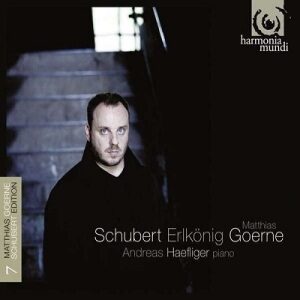In Matthias Goerne’s Volume 7 of his ongoing Schubert Edition he offers a program of 19 songs, its title derived from perhaps the most famous of them, Schubert’s daring and dramatic setting of Goethe’s Erlkönig. However, Goerne doesn’t begin the recital with that or another similarly rousing opener; rather we’re greeted with Im Abendrot (In the evening glow), one of Schubert’s simplest, most tranquil, contemplative, and utterly lovely creations. And, by the time Goerne has finished the first two lines, “Oh, wie schön is deine Welt,/Vater, wenn sie golden strahlet…”, we are hooked as surely as (but certainly more happily than) the trout in Die Forelle (which comes later in the program).
In my 2009 review of his equally fine Die schöne Müllerin for this same label (read the review here), I highlighted Goerne’s “extraordinarily sensitive performances”, marked by “artful phrasing” and complemented by his “lovely, warmly resonant tone, with a vibrant, focused center that leaves no doubt about intonation or interpretive emphasis.” And without question, four years later, all of these same attributes are on full display here. There is not a wrong turn, a casually tossed phrase, or an infelicitous choice of tempo or expressive gesture. This is Schubert singing that both defines and celebrates the consummate singer at home with and in complete command of his material.
The chosen songs are concerned with themes of wandering (Im Walde; Der Wanderer), various types of journeys (Auf der Bruck; Normans Gesang), nature (real, but more often symbolic)—the sun, the moon (An den Mond), rain, a river (Der Strom)—the fantastic and frightening (Erlkönig; Der Geistertanz), longing, grief for lost love, death (of both heart and soul). It’s a masterfully composed program, and I have to say, I’ve listened to it more than a dozen times and I can’t imagine ever becoming tired of either the music or of Goerne’s unsurpassed—and I would even say unequaled—singing of it. Yes, the title song is charged with fright and fearsome, closeup, headlong energy—almost too much so, as it literally bursts from the soothing calm of the previous song, An den Mond, which to my ears, especially in Goerne’s and Haefliger’s performance, is the embodiment of “pure song”, referred to in the opening line from Der Fluss, also included on the program.
Andreas Haefliger is a master accompanist, a truly sympathetic and—where required—assertive partner. Where Goerne captures the life and breath of the songs’ textual poetry, Haefliger understands and elucidates the same in Schubert’s perfectly-conceived piano accompaniments. I found myself at many moments listening as much or more to the piano as to the vocal melodies. I’m not certain of the make and model of the piano (the recording was made in a Berlin studio), but it also should get some sort of special billing: its gorgeous tone (and fine tuning) is an undeniable asset to the production’s overall success, all of which makes its memorable impression with the aid of yet another partner—superb sound engineering. What more is there to say? This is not only Goerne’s best Schubert recording to date, but it’s among the finest Schubert lieder recordings in the catalog.
































